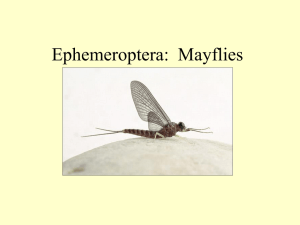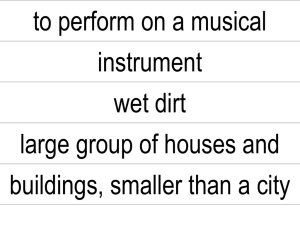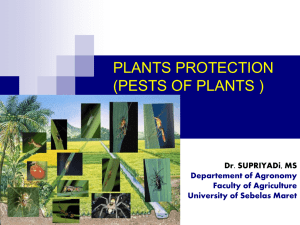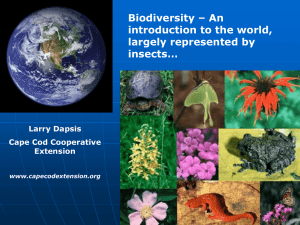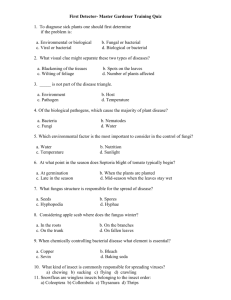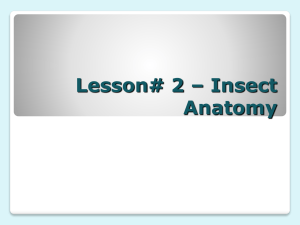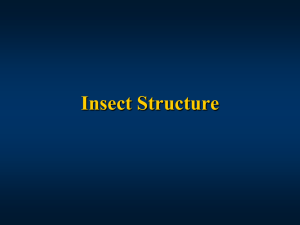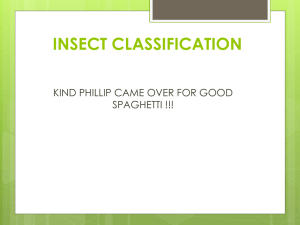MG-Intro to Insects
advertisement
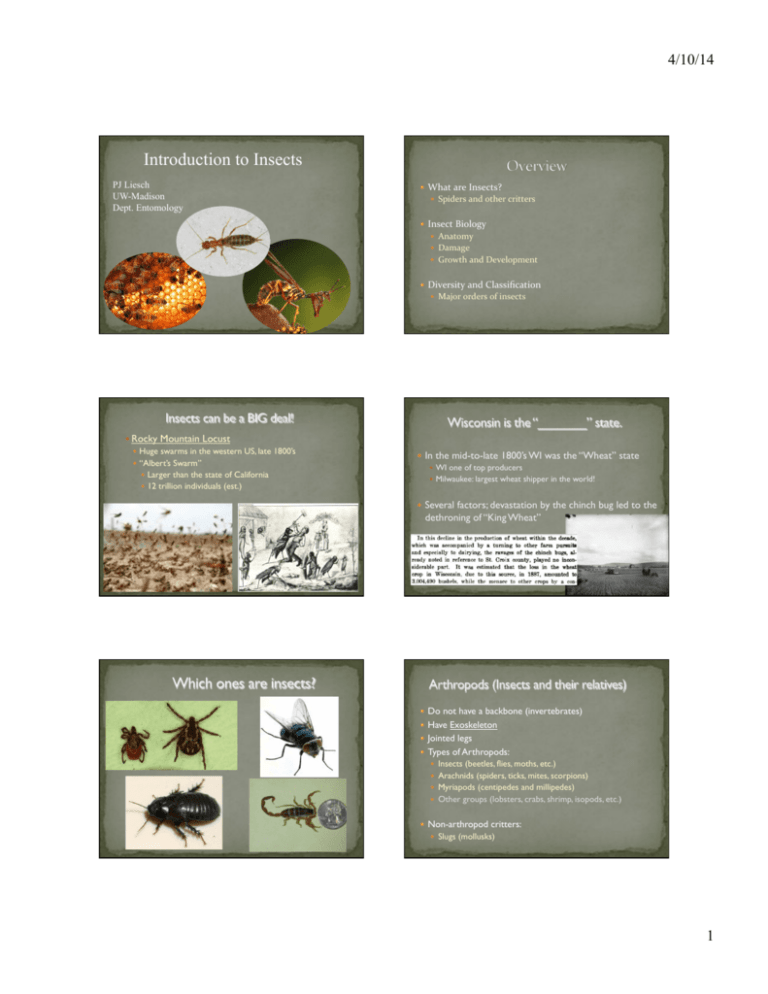
4/10/14 Introduction to Insects PJ Liesch UW-Madison Dept. Entomology ! What%are%Insects?% ! Spiders%and%other%critters% ! Insect%Biology% ! Anatomy% ! Damage% ! Growth%and%Development% ! Diversity%and%Classification% ! Major%orders%of%insects% ! Rocky Mountain Locust ! Huge swarms in the western US, late 1800’s ! “Albert’s Swarm” ! Larger than the state of California ! 12 trillion individuals (est.) ! In the mid-to-late 1800’s WI was the “Wheat” state ! WI one of top producers ! Milwaukee: largest wheat shipper in the world! ! Several factors; devastation by the chinch bug led to the dethroning of “King Wheat” ! Do not have a backbone (invertebrates) ! Have Exoskeleton ! Jointed legs ! Types of Arthropods: ! Insects (beetles, flies, moths, etc.) ! Arachnids (spiders, ticks, mites, scorpions) ! Myriapods (centipedes and millipedes) ! Other groups (lobsters, crabs, shrimp, isopods, etc.) ! Non-arthropod critters: ! Slugs (mollusks) 1 4/10/14 ! (Non-insect) arthropods ! Myriapods: Non-insect arthropods ! 2 Body regions ! Long, rounded bodies ! 8 legs ! Many body segments ! No wings ! 1 pair antennae ! 0 - 8 simple eyes ! Many legs ! Centipedes = 1 pairs/segment ! No antennae ! Millipedes = 2 pair/segment ! “Good guys” ! Centipedes : predators ! Millipedes: “recyclers” ! Arthropod ! Mollusks (NOT arthropods) ! Related to snails, clams, squid ! Exactly 3 body regions ! No legs ! Head, thorax, abdomen ! Soft bodies ! 6 legs ! Coated in mucus-like “slime” ! Antenna-like sensory tentacles ! Up to 2 pairs of wings ! Very sensitive to sunlight and drying out ! ONLY in adults ! Compound eyes (many lenses) ! Few simple eyes may be present ! 1 Pair antennae Insects' Spiders' Exoskeleton' Yes% Yes% Jointed'legs' Yes% Yes% Body'Regions' 3%regions% 2%regions% Legs' 6%legs% 8%legs% Antennae' 1%pair% None% Wings' 0,%1,%2%pairs%possible% (Adults%only)% None% ! Insects covered with hard outer shell ! Difficult to sense environment ! Have sensory hairs (like cat whiskers) ! Must molt as they grow 2 4/10/14 ! Process of shedding “old” covering ! Molting regulated by hormones ! Some insecticides can mimic insect hormones ! Insects don’t have lungs! ! Openings in exoskeleton called spiracles ! Spiracles lead to “air ducts” called tracheae ! Some insecticides (soaps, oils) interfere with air exchange Insect Mouthparts • Work like pliers / scissors • Tear or slice off pieces of food material 3 4/10/14 • Work like a soda straw or a hypodermic needle • Used to “drink” liquid diet • Used by both herbivores and predators 4 4/10/14 Two forms of development (change): 1. Simple / incomplete / gradual Egg – Nymph – Adult ! All life stages look and behave similarly 2. Complete / advanced ! Whole family can live and feed together 5 4/10/14 Egg – Larvae – Pupae – Adult ! Larvae do not look like adults ! Often wormlike ! Ex. caterpillars, white grubs, maggots, etc. ! Can live in different environment ! Larvae and adults tend to eat different foods ! Larvae usually the main pest 6 4/10/14 Insect Diversity Number of known animal species: ~1,250,000 Insect Diversity Number of known insect species: ~ 920,000 ! Classifying insects helps us make general conclusions: ! About life cycles ! Potential damage to crops 1 out of every 4 animals on the planet is a beetle! ! 29 Insect Orders ! Each Order consists of many Families ! Physical appearance (mouthparts, wings, etc.) ! Which pesticides will likely work ! Where to start looking form more information ! Coleoptera: (Beetles) many pests and beneficials ! Hymenoptera: (Bees, Wasps) many beneficials ! Diptera: (Flies) some pests, some beneficials ! Lepidoptera: (Butterflies, Moths) many pests ! Neuroptera: (Lacewings) beneficials ! Hemiptera: (True Bugs) many pests, some beneficials ! Orthoptera: (Grasshoppers) can be pests ! Thysanoptera: (Thrips) some pests 7 4/10/14 ! “Thrips” ! Grasshoppers, crickets, katydids ! Very small (few mm long) ! Can be quite large (> 1” long) ! Have fringed wings ! 2 pairs wings (1st pair leathery) ! Simple development ! Strong back legs ! Scraping mouthparts ! Chewing mouthparts ! Simple development ! Some species are pests: ! Can be very problematic in greenhouses ! Can occur in large numbers (swarms) ! Many are generalist feeders (will eat just about anything!) 1st pair: leathery, thickenedOrthoptera wings ! Most problematic in dry years ! Can become heavily infested with nematodes (roundworms) ! Eggs eaten by blister beetle larvae 2nd pair: thin flying wing ! Aphids, Plant Bugs, Stink Bugs, Cicadas, Spittlebugs ! Large, diverse group (~10,000 species) ! Can be small (aphids) to large (cicadas) ! 2 pairs wings (1st pair often partly leathery) ! Wings sometimes absent (ex. aphids) ! Many are plant feeders (can be pests) ! ex. Potato leafhopper, cicadas, aphids, spittlebugs ! Some are predators (beneficials) ! ex. Soldier bugs, Assassin bugs ! Sucking mouthparts ! Some species can transmit plant diseases ! Simple development ! Some pests are specialists ! ex. Soybean aphid (alternates between soybeans and buckthorn) ! Others are generalists ! ex. Brown Marmorated stink bug (will feed on many different types of plants) 8 4/10/14 Two sets of wings: • 1st pair: (= Hemilytra) leathery upper, thin bottom parts • 2nd pair: thin and membranous Predators Pests ! Green and Brown Lacewings, others ! Small group (~6,000 species) ! Typically small sized (~1/2 inch long) ! Adults have large, bulging eyes ! 2 pairs wings ! Membranous, lace-like wing veins ! Complete development ! Chewing mouthparts (adults) ! Sucking mouthparts (larvae) ! Both larvae and adults are fierce predators (beneficials) 9 4/10/14 ! Moths and Butterflies (Larvae are caterpillars) ! Large, diverse group (150,000+ species) ! Greatly vary in size ! 2 pairs wings (adults) ! covered in microscopic scales ! Complete development ! Sucking mouthparts (adults) ! Chewing mouthparts (larvae) ! Larvae can be pests ! Many of our important crop pests belong to this group ! ex. Corn Earworm, Cutworms, Armyworms, Stalk Borers, etc. • 3 pairs of true legs • 4-5 pairs of prolegs often present, have hooks called crochets Sawflies: • Not Lepidoptera! • 7 pairs of prolegs • No crochets http://nationalmothweek.org/ 10 4/10/14 ! Beetles (Larvae often called “grubs”) ! Largest group of insects (350,000+ species) ! Greatly vary in size ! Some of our common beetles: ! White grubs (larvae of Scarab beetles) ! Japanese Beetles ! “Junebugs” (May/June Beetles) ! Often have very hard body ! Weevils, Curculio ! 1 pairs wings (adults) ! Wings covered by hard protective “shell” (elytra) ! Complete development ! Leaf beetles ! Corn rootworms ! Wireworms/Click beetles ! Chewing mouthparts (adults & larvae) ! Bean Leaf Beetle ! Fireflies ! Flour Beetles Wing covers (elytra) True wings hidden at rest Corn Rootworm Multicolored Asian Lady Beetle 11 4/10/14 Alfalfa Weevil White Grub "I went out collecting with Albert Way of Trinity, who in after years became a well-known archaeologist; also with H. Thompson, afterwards a leading agriculturalist, chairman of a great railway, and a Member of Parliament. It seems therefore that a taste for collecting beetles is some indication of future success in life." - Charles Darwin ! True Flies (Larvae often called “maggots”) ! Includes: mosquitoes, house flies, deer flies, horse flies, etc. ! Large, diverse group (~ 100,000 species) ! Greatly vary in size ! 1 pairs wings (adults) ! Hind wings have been greatly reduced to small clubs ! Complete development ! Chewing or slicing mouthparts (larvae) ! Variable mouthparts (adults) ! Some can be pests, others beneficials Diptera (Continued) Horse fly < 1 pair of wings 12 4/10/14 Fly larvae (maggots) Halteres ! Sawflies, Ants, Bees, Wasps ! Large, diverse group (~ 100,000+ species) ! Greatly vary in size (some wasps are tiny!) ! 2 pairs of membranous wings (adults) ! Wings hooked together to work as 1 large pair ! Complete development ! Chewing mouthparts ! Some can be pests, others beneficials 13 4/10/14 Beneficial Wasps %%CommerciallyNAvailable%Parasitic%Wasps% ! Several%different%species%available% ! Can%be%ordered%through%a%number%of%companies% % http://www.youtube.com/watch?v=rLtUk-W5Gpk Contact%Info:% Patrick%(PJ)%Liesch% Insect%Diagnostic%Lab% http://labs.russell.wisc.edu/insectlab/% pliesch@wisc.edu% 14
